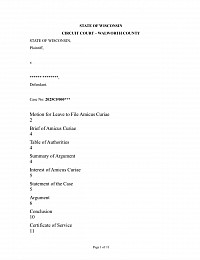Amicus Curiae Brief on Discrimination
Motion for Leave to File Amicus Curiae
NOW COMES Cassandra Davis, by and through her role as Founder and Executive Director of Finding Camelot, and respectfully moves this Court for leave to file an Amicus Curiae Brief in the above-captioned matter. In support of this Motion, Ms. Davis states as follows:
- Interest of Amicus: I am Cassandra Davis, the founder of Finding Camelot, a nonprofit organization dedicated to strengthening the quality of life for working-class individuals and advocating for the protection of fundamental liberties. I am also a physically disabled resident of Walworth County, Wisconsin.
- Relevance: The circumstances leading to Mr. *********’s arrest appear to include a potentially unlawful traffic stop that raises concerns under the Americans with Disabilities Act (ADA), as the only known basis for the stop involves a vehicle registered to me—a non-driver due to physical disability. The arrest also resulted in a $5,000 cash bond for a nonviolent, victimless offense, raising significant concerns about the constitutionality and discriminatory impact of cash bail.
- Value to the Court: The proposed amicus brief offers a unique perspective grounded in lived experience, nonprofit advocacy, and the structural consequences of inequitable bond practices. The brief includes relevant case law, constitutional principles, and evidence-based analysis that may assist the Court in assessing the broader impact of its bond-setting decisions, especially where the legality of the underlying stop is under question.
- Timeliness: This Motion and accompanying brief are being submitted while Mr. ********* remains in custody and while pretrial proceedings are ongoing, making the proposed contribution both timely and necessary.
- Prejudice: No party will be prejudiced by the granting of this Motion. The amicus seeks only to provide information and context for the Court’s consideration and does not seek to intervene as a party or to delay proceedings.
WHEREFORE, Cassandra Davis respectfully requests that this Court grant her leave to file the attached Amicus Curiae Brief in support of Defendant ****** *********.
Dated this 4 day of April, 2025.
Respectfully submitted,
/s/ Cassandra DavisCassandra Davis
Founder & Executive Director, Finding Camelot
Brief of Amicus Curiae
Table of Authorities
42 U.S.C. § 12132........................................................................................................6
State v. Post, 2007 WI 60, 301 Wis. 2d 1, 733 N.W.2d 634.............................6
Title II, 28 C.F.R. § 35.130(b)(3).......................…………........................................7
Stack v. Boyle, 342 U.S. 1 (1951)............................................................................8
State v. Taylor, 2017 WI App 52.............................................................................9
Wisconsin Stat. § 969.01(1).....................................................................................8
Summary of Argument
Mr. *********’s arrest and detention raise substantial legal and constitutional concerns. The traffic stop appears to have been initiated based on an improper assumption regarding the vehicle’s disabled registrant, in potential violation of the Americans with Disabilities Act. His subsequent detention on a $5,000 cash bond—despite nonviolent, victimless charges—violates state and federal guarantees against excessive bail, imposes economic discrimination, and reflects a larger systemic injustice. This Court has the power and responsibility to correct that course.
Interest of Amicus Curiae
I am the founder and executive director of Finding Camelot, a nonprofit organization dedicated to enhancing the quality of life for the working class and advocating for the protection of fundamental liberties. As a Wisconsin resident and a person with a physical disability, I have personal and organizational interests in ensuring that law enforcement actions are not tainted by discrimination—whether based on disability, economic status, or other protected characteristics.
Finding Camelot works with disenfranchised individuals and families in Wisconsin, many of whom have been impacted by cash bond practices that undermine the presumption of innocence and disproportionately penalize poverty. I offer this brief to highlight how Mr. *********’s arrest and subsequent detention raise legal and constitutional concerns that warrant both immediate judicial scrutiny and broader systemic reform.
Statement of the Case
On March 12, 2025, ****** ********* was arrested following a traffic stop in Walworth County. He was subsequently charged and held on a $5,000 cash bond. The stop that initiated this arrest appears to have been made without probable cause and may constitute a violation of the Americans with Disabilities Act (ADA). The vehicle is registered to a physically disabled woman without a driver’s license—whom Mr. ********* is employed by. This is something that would not have been known unless the license plate had been run through a database first.
There is no indication that officers had any reasonable suspicion to believe that a disabled woman was driving. Without an articulable basis for the stop, the initial seizure of Mr. ********* appears unlawful. His release date is currently scheduled for April ** of 2025 but he will remain incarcerated unless the $5000 cash bond is posted.
Argument
1. The Traffic Stop Lacked Reasonable Suspicion
Wisconsin law is clear that law enforcement may not detain individuals without reasonable suspicion based on “specific and articulable facts.” (State v. Post, 2007 WI 60, ¶10, 301 Wis. 2d 1, 733 N.W.2d 634). The suspicion must be individualized and not based on speculation or assumptions.
In this case, the only known fact prompting the stop was that the vehicle was registered to a disabled individual who does not possess a valid driver’s license due to their physical disability. There is no evidence that officers observed any traffic violation, erratic behavior, or other indicators justifying the stop. Notably, Mr. ********* is a different gender and able-bodied—a fact that could have been confirmed with a simple visual check. This raises two major concerns:
- Americans with Disabilities Act Violation: The ADA prohibits public entities from excluding or discriminating against qualified individuals with disabilities in the provision of services, programs, or activities. (42 U.S.C. § 12132). Law enforcement activity, including traffic stops, is governed by this provision and its implementing regulations.
By initiating a traffic stop based on the fact that a vehicle is registered to a disabled person, officers relied on disability-related DMV data to make a presumption about the current driver. This type of inference constitutes discriminatory profiling based on disability, which courts and the Department of Justice have found impermissible.
The DOJ has made clear that public entities have an “affirmative obligation to avoid discrimination” when using disability-related information (see DOJ Civil Rights Division, ADA Best Practices for Law Enforcement, 2010). A policy or practice that disproportionately subjects disabled vehicle owners to investigatory stops—despite no evidence they are driving—violates Title II, 28 C.F.R. § 35.130(b)(3) of the ADA. The ADA requires reasonable modifications to avoid discrimination on the basis of disability (42 U.S.C. § 12132; 28 C.F.R. § 35.130(b)(3)). Conducting investigatory stops based on disability registration data—absent individualized suspicion—violates these protections.
- Lack of Probable Cause Under the Fourth Amendment: Even if this were not an ADA matter, the stop remains unconstitutional. Law enforcement must have a particularized, objective basis for suspecting the person stopped of criminal activity. Here, Mr. ********* is an able-bodied man. Officers could not have reasonably suspected that a visibly disabled woman was operating the vehicle. To believe otherwise requires a level of speculation that the Fourth Amendment does not permit.
Therefore, the stop was unconstitutional under both state and federal law, because it was unsupported by reasonable suspicion. This raises grave constitutional and civil rights concerns, especially when paired with an unreasonably high bond.
2. The Purpose of Bail Is Not Being Served
Under both Wisconsin law and federal constitutional doctrine, the primary purpose of bail is to ensure the defendant’s appearance at trial—not to impose punishment prior to a finding of guilt. As the United States Supreme Court held in Stack v. Boyle, 342 U.S. 1, 5 (1951):
“Bail set at a figure higher than an amount reasonably calculated to fulfill [the] purpose is ‘excessive’ under the Eighth Amendment.”
Wisconsin Stat. § 969.01(1) echoes this principle:
“A court shall release a defendant charged with a crime other than a capital offense on his or her personal recognizance or upon execution of an unsecured appearance bond...”
In the present case, there is no evidence that Mr. ********* poses a flight risk. In fact, he has significant ties to the community, including employment and personal obligations that would naturally encourage compliance with court proceedings.
The imposition of a $5,000 cash bond in this case fundamentally misaligns with the constitutional and statutory purpose of pretrial release. By conditioning Mr. *********’s liberty on a sum that he is financially unable to meet, the court has effectively imposed preventive detention without due process, something expressly disfavored in Wisconsin jurisprudence. Such pretrial incarceration for nonviolent and victimless conduct functions as a tool of economic discrimination, stripping liberty on the basis of financial status.
3. The Cash Bond is Excessive and Violates the Wisconsin Constitution
The Wisconsin Constitution, Article I, Section 8, guarantees that “excessive bail shall not be required.” While public safety may justify a high bond in some instances, Mr. *********’s charges are victimless, circumstantial, and non-violent, and do not justify the imposition of a $5,000 cash bond.
This court must be mindful of the 2017 ruling in State v. Taylor, where the Wisconsin Court of Appeals emphasized that courts must consider a defendant’s ability to pay when setting bail, noting that setting bail in an amount the accused cannot pay “effectively denies bail altogether.” (State v. Taylor, 2017 WI App 52, ¶20).
4. Systemic Impacts and the Role of the Court
The ramifications of pretrial detention extend beyond individual cases, contributing to broader societal inequities. Nationally, over 400,000 individuals are detained pretrial, legally presumed innocent yet incarcerated due to inability to afford bail.
In Walworth County, the jail has a capacity of 512 beds. While specific data on pretrial detainees in this county is not readily available, statewide trends indicate that a significant portion of jail populations consists of individuals held pretrial, often due to inability to post bail.
The consequences of such detention are profound:
- Economic Hardship: Pretrial incarceration can lead to job loss, housing instability, and financial strain on families.
- Coerced Guilty Pleas: Facing prolonged detention, some defendants may plead guilty, regardless of actual culpability, to secure release.
-
Racial Disparities: The cash bail system disproportionately affects minority communities, exacerbating existing inequalities.
The Wisconsin Court System has initiated pilot programs aimed at reducing reliance on cash bail in favor of risk-based assessments. However, these reforms are not yet widespread.
Conclusion
This case arises from a traffic stop based on flawed assumptions about disability, followed by pretrial detention rooted in economic disparity.
- The $5,000 cash bond is excessive, unjustified by the facts, and unconstitutional;
- The systemic use of cash bail disproportionately harms disabled, poor, and minority communities;
- The purpose of bail—ensuring appearance, not punishing poverty—is not being served;
- A Citizen Complaint No. 25-012*** was filed on March 25, 2025. It is regarding the conduct of the officers involved in the stop. The existence of this inquiry highlights the need for judicial caution in accepting the legitimacy of the arrest at face value.
This Court has the authority and the opportunity to uphold constitutional principles by:
- Acknowledging the constitutional concerns raised by excessive cash bail;
- Reducing Mr. Zacharias’s bond to a recognizance release or a nominal, affordable amount;
- Considering the broader systemic consequences of wealth-based detention, especially where no threat to public safety is present.
Justice must not be withheld based on disability or economic status. The integrity of the system depends on ensuring it remains accessible—and accountable—to all. Mr. *********’s scheduled release date of April **, 2025, will pass unmet unless this Court acts.
Respectfully submitted,
/s/ Cassandra Davis
Cassandra Davis
Founder & Executive Director, Finding Camelot


